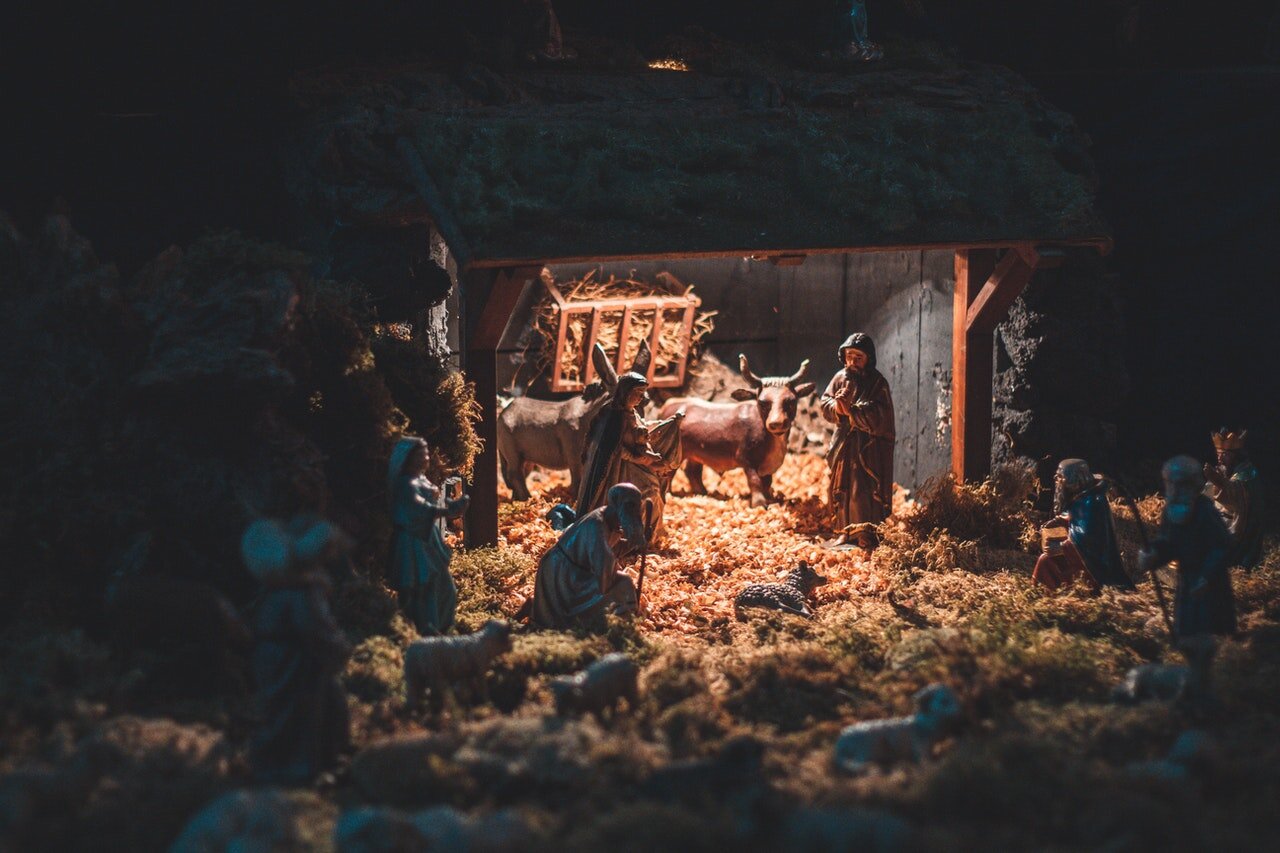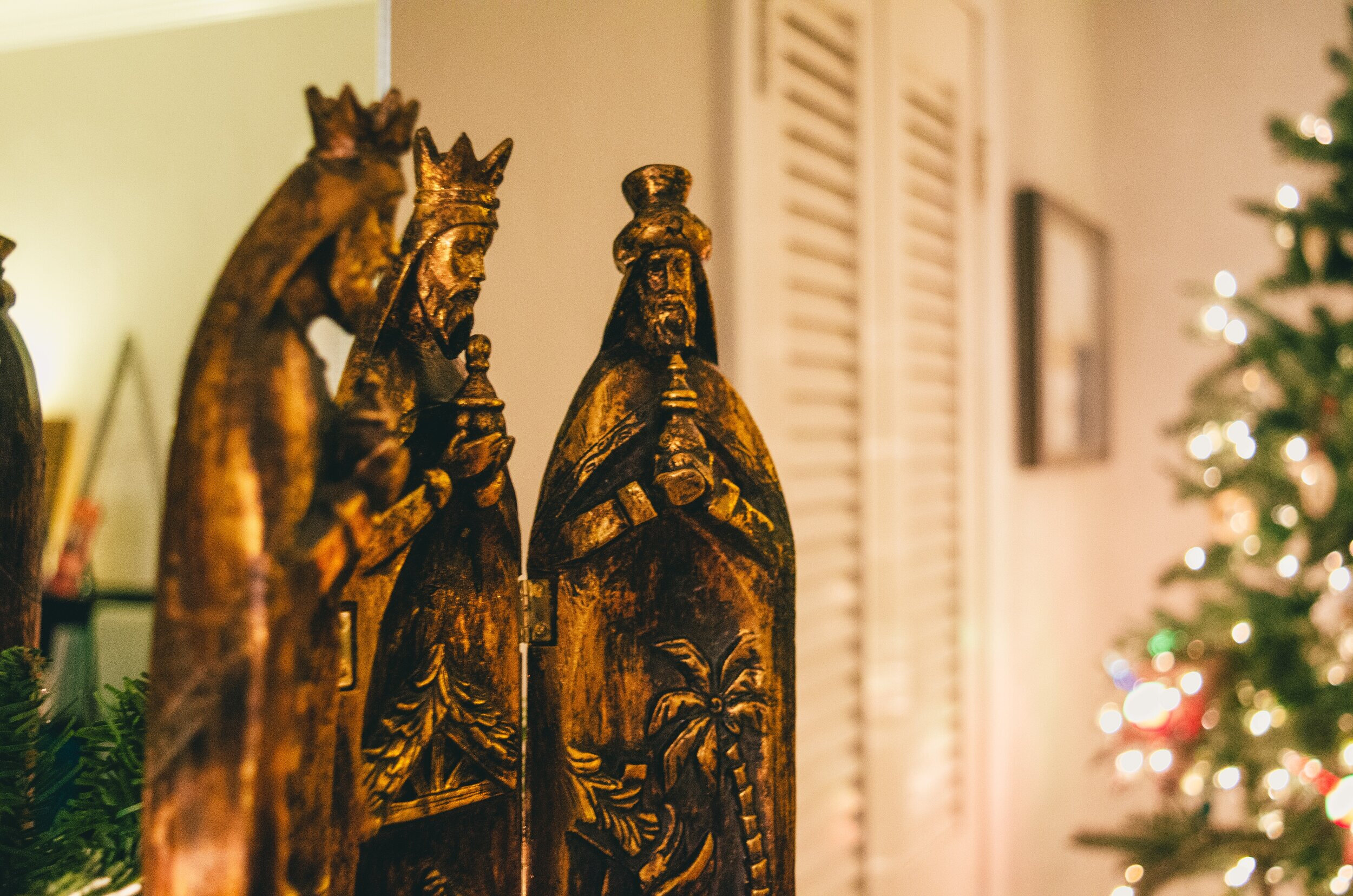by Rev. Carole Horton-Howe
Please note that the following sermon text was provided prior to the audio recording. The two versions may differ substantially.
Luke 2:1-20
In those days a decree went out from Emperor Augustus that all the world should be registered. This was the first registration and was taken while Quirinius was governor of Syria. All went to their own towns to be registered. Joseph also went from the town of Nazareth in Galilee to Judea, to the city of David called Bethlehem, because he was descended from the house and family of David. He went to be registered with Mary, to whom he was engaged and who was expecting a child. While they were there, the time came for her to deliver her child. And she gave birth to her firstborn son and wrapped him in bands of cloth, and laid him in a manger, because there was no place for them in the inn.
In that region there were shepherds living in the fields, keeping watch over their flock by night. Then an angel of the Lord stood before them, and the glory of the Lord shone around them, and they were terrified. But the angel said to them, "Do not be afraid; for see-- I am bringing you good news of great joy for all the people: to you is born this day in the city of David a Savior, who is the Messiah, the Lord. This will be a sign for you: you will find a child wrapped in bands of cloth and lying in a manger." And suddenly there was with the angel a multitude of the heavenly host, praising God and saying,
"Glory to God in the highest heaven, and on earth peace among those whom he favors!"
When the angels had left them and gone into heaven, the shepherds said to one another, "Let us go now to Bethlehem and see this thing that has taken place, which the Lord has made known to us." So they went with haste and found Mary and Joseph, and the child lying in the manger. When they saw this, they made known what had been told them about this child; and all who heard it were amazed at what the shepherds told them. But Mary treasured all these words and pondered them in her heart. The shepherds returned, glorifying and praising God for all they had heard and seen, as it had been told them.
Some dear friends of mine were in London a few years ago and had an interesting experience. Instead of staying in a hotel, they rented what’s called a narrow boat. These are moored in the canals that wind through London. And although their boat was stationary, other narrowboats would travel by them at the brisk pace of about 3 or 4 mph. Boats are long and narrow from 50 to 70 feet long and about 6 feet wide. And they are steered from the back.
One morning they were sitting out on their deck when a narrow boat started to come slowly past them. And perched on the front like a hood ornament on a car was a startling sight – a pink stiletto shoe! A stiletto is a very fancy piece of ladies footwear - a pointed toe and a pencil thin heel about 5 inches tall. And there was just one. It’s hard to imagine a stranger sight! Perched on the bow of this rough and sturdy river boat. And they wondered immediately – what is the story?
Now conversations with other boaters on the river is a common thing. They tend to be an easy going, collegial group of folks. And as the back of the boat approached they could have greeted the captain and asked about the pink stiletto. But they didn’t. They didn’t ask. They didn’t want to take a risk. I’m not sure why. Maybe they were afraid to look foolish or interrupt his train of thought. But they didn’t get the story. They missed out. To this day, they wonder what it was all about. And they are pretty sure they missed a unique story from an interesting man.
My friends’ adventure – or misadventure – reminds me of the shepherds and their reaction to the announcement of the angels, their opportunity to ask, to hear the story, to be witnesses to the triumph of the power of love over the love of power. Their response to seeing the angels, hearing about the baby in the manger was to go and see.
The angels were the ones God sent to tell the good news to the shepherds. In those days, shepherds were not considered quaint or delightfully simple. They were considered unclean, dishonest, and religiously lacking. It’s hard to keep the Law of Moses on a hillside but it doesn’t seem that anyone cut them any slack for that. In fact, the shepherds were almost certainly the least important of those within walking distance of Bethlehem. But they heard the news first.
God is like that. God reveals the most wonderful things to those who society doesn’t think are especially worthy of wonderful things. And so they went. More important that the flock, more important than anything else. No one stayed behind. None of the shepherds said “I don’t think I’ll go, I’ll just stay here. You let me know what happened, fill me in later.” They dropped everything and went.
And what happens when you come to visit a newborn and its family? I suspect it’s been the same throughout time. You see this tiny infant. And you’re just awash with the miracle of it all. There’s been a long wait for the little one to arrive. Even if you’ve seen those incredible scans that medical technology can provide today there’s still nothing like seeing the baby. There’s nothing like holding the baby which moms usually offer. “Would you like to hold the baby?”
And I wonder if Mary, after hearing that they also had a visit from an angel just as she had, just as Joseph had and pondering it in her heart, I wonder if Mary didn’t feel such a connection to these wild and rough shepherds if she didn’t ask if he wanted to hold the baby.
If you had a chance this Christmas morning to hold the baby Jesus in your arms, what would you say to him?
In 1994 Richard Schmidt wrote a reflection entitled, “Christmas: Let Me Hold You, Dear Little Jesus.”
Little Jesus, let us hold you now. On this holy day of celebration, let us cradle you in our arms. Let us hold you and keep you warm. Now, while you are small and vulnerable, let us watch over you. We want to hold you now, because very often in times to come, you will hold us.
Sleep well, sweet baby. Rest your tiny eyes. For someday you will look at the world and you will see the pain and loneliness and ache that humans bear. You will look at us and see us just as we are, with all our loveliness and sins. You will look and see the Christ within each one of us, and you will try to teach us to see it too.
Hush now, sweet baby. For someday from your mouth eternity will speak. Your words will define grace, pronounce blessings, teach, and paint pictures with words so we too might see our eternal God the way you know God to be. You will speak forgiveness to those who wrong you, will invite us to paradise to be with you forever, will send us forth in your name to all the world. Your words will echo down through centuries, bringing meaning and hope to our lives.
Rest now, tiny child. For someday you will walk many miles to bring good news to the poor, to proclaim release to the captives. Someday you will stride out across billowing waves in a storm-tossed sea. Rest your feet now, for someday millions will follow in your footsteps.
And sweet baby, with your little heart, how much love you will show. Rest now. And let us hold you. Someday we will feel deep sadness and sorrow. Something will happen in our lifetimes that grieves us so deeply that we may wonder where you are. But you will come to us, then, not as a helpless baby, but as the Prince of Peace. You will remind us of the promises of God, of the strength of hope, of God’s deep loving kindness, God’s steadfast love. You will hold us close, and if we are quiet enough to hear, you will whisper to us that all will be well. You will tell us that you are here for us always, not just when we are empty enough to know we need you. You walk beside us, offering us your peace every day.
You will come to us not be a helpless infant then. When you come to find us, you will come as our Wonderful Counselor, our deliverer. You will tell us that you searched for us. And when you find us, you will invite us to your banqueting table and nourish us with your very self. You will remind us that we belong to you; we are yours.
You will do all of these things for us at great cost to yourself. You will teach us the meaning of giving, all that we have and are, on behalf of goodness and love, no matter the cost.
But that will be someday. Today we adore you as a baby. We welcome you as a helpless, vulnerable babe, as the Almighty God who became a child so we could become full mature human beings. This is the day, the wondrous day when the creatures hold our creator. This is the day of grace, when the Lord of heaven and earth stoops down, reverses roles, and allows us – the finite – to serve the infinite God.
This Christmas day, don’t miss out on the story. Come to the manger. Come to the light. This is God’s story, it’s our story. Everything we need to celebrate what is good and get through the dark times is there. Amen.






